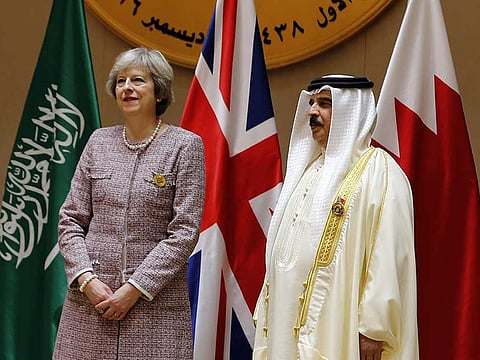Britain will help Gulf ‘push back’ against Iran aggression
UK wants ‘strategic partnership’ to help boost security in Gulf, May tells GCC Summit

Manama: Britain will help the Gulf Cooperation Council (GCC) in “pushing back against Iran’s aggressive regional actions” and in securing stability in the region, British Prime Minister Theresa May has said.
“As we address new threats to our security, so we must also continue to confront state actors whose influence fuels instability in the region,” May told the leaders of the six GCC member countries in Bahrain.
“So I want to assure you that I am clear-eyed about the threat that Iran poses to the Gulf and the wider Middle East. The UK is fully committed to our strategic partnership with the Gulf and working with you to counter that threat.
"We secured a deal which has neutralised the possibility of Iran acquiring nuclear weapons for over a decade. It has already seen Iran remove 13 thousand centrifuges together with associated infrastructure and eliminate its stock of 20 per cent enriched uranium.
"That was vitally important for regional security. But we must also work together to push back against Iran’s aggressive regional actions, whether in Lebanon, Iraq, Yemen, Syria or in the Gulf itself,” she said as she became the first British prime minister and the first woman leader to attend the annual summit of the GCC countries – Bahrain, Kuwait, Oman, Qatar, Saudi Arabia and the United Arab Emirates.
May, who became prime minister in July and was making her first visit to the region, stressed that the British commitment to the region would be more permanent.
“As part of the renewed relationship that I want to forge with you, the United Kingdom will make a more permanent and more enduring commitment to the long-term security of the Gulf. We will invest in hard power, with over £3 billion of defence spending in the region over the next decade, spending more on defence in the Gulf than in any other region of the world,” she said.
“Through the construction of HMS Jufair, and thanks to the generosity of the Kingdom of Bahrain, we will create a permanent presence in the region, the first such facility east of Suez since 1971, with more British warships, aircraft and personnel deployed on operations in the Gulf than in any other part of the world.”
The prime minister said that she was “determined that the UK will be at the forefront of a wider Western effort to step up our defence and security partnership.”
“We will establish a new British Defence Staff in Dubai to co-ordinate our regional activities and, here in Bahrain, we will embed a dedicated military officer with the Ministry of Interior bomb disposal unit to provide bomb scene management support and training.
“We will establish a new Joint Working Group on Counter-Terrorism and Border Security and a new National Security Dialogue at GCC level to protect critical national infrastructure, facilitate faster intelligence sharing on suspected foreign terrorist fighters and implement traveller screening systems to detect terrorists attempting to pass through any GCC airport.
“And because we know that our enemies are increasingly using the internet against us, we will use our expertise in cyber security technologies to build our resilience, and that of our international partners.
“So we are appointing world-leading cyber experts with extensive backgrounds in delivering cyber security in the UK to provide focused advice to Gulf States on developing your own capacity – as well as a new Cyber Industry Representative based in the region who will build links between cyber sectors in the UK and the Gulf.”
The enhanced GCC-UK partnership will also cover trade agreements, she added.
“For just as Gulf security is our security, so your prosperity is also our prosperity. Already the Gulf is a special market for the United Kingdom. Last year alone, trade between the UK and GCC was worth more than £30 billion. At the same time Gulf investment in the UK is helping to regenerate cities from Aberdeen to Teeside, and from Manchester to London.
“I am determined that we should do everything possible to build on this and elevate our trade and investment to an even more ambitious level. So I will continue the work that the UK has been leading over the past three years to make London one of the great capitals of Islamic finance anywhere in the world. And as Britain leaves the European Union so we intend to take a leap forward, to look outwards and seek to become the most committed and most passionate advocate of free trade in the world.
“For free trade makes us all richer. It creates jobs. It increases investment. It improves productivity. It transforms living standards and creates opportunities for all of our citizens. And nowhere is that more important than here with our friends and allies in the Gulf,” she said.
Sign up for the Daily Briefing
Get the latest news and updates straight to your inbox



